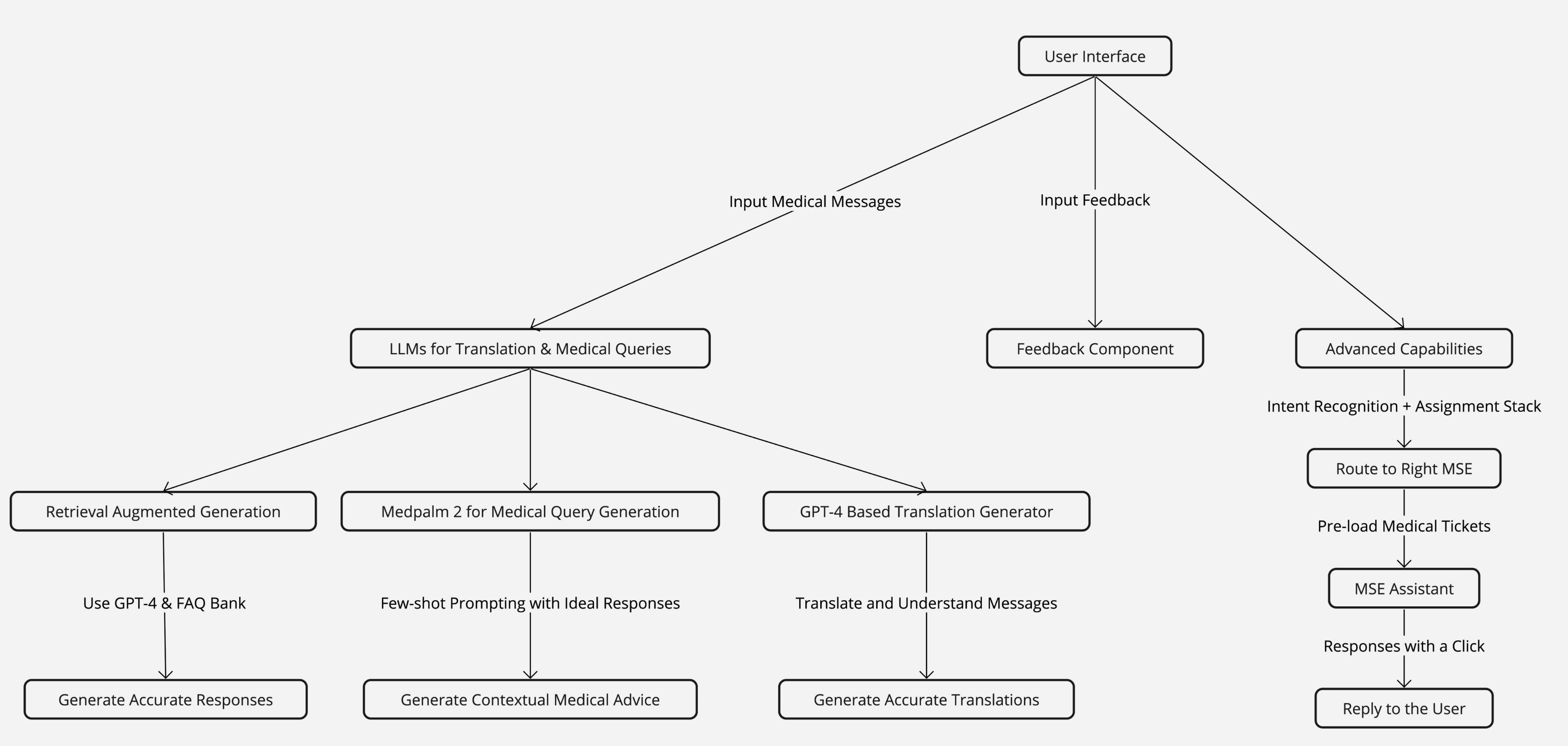Development
- Architecture Overview (Technical Stack, Data Flow, APIs): Backend Processing and API Integration, Handling and Resolution of Medical Queries
- Translation and Localisation Support
- Performance Optimisation and Scalability
Webapp with a backend on the LLM Chat Bot Application

System Components:
User Interface
A UI for Inputing Medical messages for response generation or translation. This interface should be accessible via web or mobile platforms, offering a seamless experience for users seeking medical information or assistance. Also have a component to input feedback for each query.
Advanced Capabilities: Using the Intent recognition + Assignment stack route the medical message to the right mse in the mse assistant. Pre-load the medical tickets and the MSEs can get responses back with just a click.
LLMs for Translation and Medical Queries (Two Ways):
Retrieval Augmented Generation: Utilize GPT-4 in conjunction with a curated FAQ bank specifically tailored for medical inquiries. This approach will enable the system to provide accurate and relevant responses by leveraging both the generative capabilities of GPT-4 and the specific, reliable information contained within the FAQ bank.
Medpalm 2 for Medical Query Generation: Employ Medpalm 2, a specialized LLM for medical queries, to generate responses to medical questions. Enhance its effectiveness through few-shot prompting, incorporating 5-8 ideal medical responses as templates for generating accurate and contextually relevant medical advice.
Translation Layer with GPT-4: Before processing queries with Medpalm 2 or the retrieval-augmented generation system, implement a translation layer using GPT-4 to ensure that messages in any language can be accurately translated and understood, broadening the system’s accessibility to non-English speakers.
Technical Stack and Tools:
Frontend: React / Next JS
Backend: Python with FastAPI for creating efficient and scalable server-side applications, facilitating the integration with LLMs and managing the system’s logic.
LLMs Integration: GPT-4 for translation and retrieval-augmented generation, along with Medpalm 2 for specialized medical query handling.
Database: SQL database systems for storing user queries, and system responses, ensuring data persistence and retrieval efficiency.
APIs: RESTful APIs to connect the frontend with the backend logic, LLMs processing, and database operations, ensuring smooth data flow and system functionality.
Caveats
Language Nuances: The translation layer must accurately capture medical terminology and nuances across languages. Regular updates and quality checks are necessary to ensure the translation accuracy for medical contexts.
Dependence on High-Quality Data: The effectiveness of the system heavily relies on the quality of the FAQ bank. Regular updates and expert review are crucial to keep the information accurate and up-to-date.
Example UI for response Generation: 
API Endpoints
-
Medical Query API Endpoint:
-
Endpoint:
/medical_query -
Method: POST
-
Description: Retrieves the final medical response along with the top sources (excludes Medpalm data).
{
"query": "User's medical query"
} -
Response Payload:
{
"final_answer": "The translated final answer",
"top_sources": ["Top source 1", "Top source 2", "Top source 3"]
}
-
-
Feedback API Endpoint:
-
Endpoint:
/feedback -
Method: POST
-
Description: Manages user feedback, capturing their rating, comments, and suggestions for the ideal answer.
{
"query": "User's original query",
"answer": "Translated final answer",
"feedback": "👍 or 👎",
"comments": "Optional comments",
"ideal_answer": "Optional suggestion for the ideal answer"
} -
Response: Indicates the operation's success or failure with an HTTP status code.
-
Example Ui for Feedback collection: 